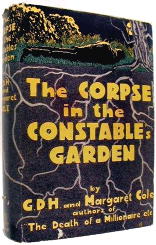Wed 4 Mar 2009
Archived Review: G. D. H. & MARGARET COLE – The Corpse in the Constable’s Garden.
Posted by Steve under Reviews[2] Comments
G. D. H. & M. COLE – The Corpse in the Constable’s Garden.
Collins Crime Club; UK, hardcover; 5th printing, 1933. US edition: Morrow, hardcover, 1931. Hardcover reprint: Grosset & Dunlap, no date (shown). Previously published in the UK 1930 as Corpse in Canonicals, Collins, hardcover, 1930.

As was pointed out in both my review of the Coles’ Knife in the Dark and the one Bill Pronzini wrote for 1001 Midnights, which was posted here, most of the mysteries they wrote featured Superintendent Harry Wilson, of New Scotland Yard.
He appeared in, among others, both their first novel (The Blanchington Tangle, 1923) and their last (Toper’s End, 1942), along with a few short story collections published during World War II and later — up through 1948 or so.
And as usual for detective stories published during that particular time period, there’s not much said about Wilson’s private life, at least not in this book. The mystery’s the thing — but this is no sober and deliberate drawing room affair, either. It’s amusing, it’s droll, and in more than one scene, if it doesn’t cause out-and-out laughter, more than a few chuckles should result as well.
There are some hi-jinks with a valuable necklace in the early going, and then the local constable discovers that someone has left a body in his garden. (I don’t think I gave anything away by disclosing this, did I?) The inspector on the scene is shadowed by an overly eager (and equally suspicious) mystery writer who lives nearby, not to mention three undergraduate chums on a walking tour who also decide to give the locals a bit of a helping hand.
Maybe my sense of humor is different from yours. I’ll quote from page 96, and you can see for yourself:
“Don’t pretend to be a fool, Hubert,” said his wife. “You know you said you liked Proust.”
“I said I liked him in moderation,” said the Colonel. “The trouble was, there wasn’t any moderation.”
I simply can’t read that without cracking a smile, and I do every time I do. But if I found the previous book a little lax in the denouement, I certainly can’t say the same about this book. There is a closing scene with all of the characters in one room, and one by one Wilson eliminates them, just the way I would have, down to the final two — the only two I’d decided who could have done it — and then to the final culprit — the very same one I’d fingered for the job.
Is that a recommendation, saying the author’s solution dovetailed in exact precision as yours? Or can you say that if it’s that obvious, it’s can’t be any good? I’m leaning toward the former, since it wasn’t obvious, and if it had been the other fellow, and I wasn’t at all sure it wasn’t, I’d have been caught flat-footed. As I almost always am.
It’s sure a nice feeling when you get it right, though!
March 6th, 2009 at 9:17 am
This from Howard Haycraft, Murder for Pleasure (Appleton Century, 1941, reprinted Carroll and Graf, 1984) on the Coles:
‘The Coles novels are extremely uneven, including some of the best police adventures of the routine school, and some of the most tedious. Always slow paced they nevertheless contain rewarding detection. In recent years the tales have shown a lamentable tendency in the direction of slovenly construction. Even more sluggish than before, they are further marred by such regretable minutiae of carelessness and haste as speeches by unintroduced characters, unnanounced changes of scene, and overlooked clues and loose ends. Without doubt the public-minded authours have aludable used for the pecuniary rewards that their detective novels bring. Nevertheless one cannot help wishing they would abandon their schedule of two or three books a year (in normal times) in favor of some less taxing level of work that might permit them to approximate their early achievements in the field. At their best, they are a credit to their avocation; at their least they represent the British Police novel at its most British — and dullest.’
A further reading of H.R.F. Keating’s slim memoir of youthful reading, Murder Must Appetize (Mysterious Press/Lemon Tree Press, 1975), points out that G.D.H. Cole was diagnosed with diabetes and knowing it was limiting his lifespan embarked on a schedule of writing both his important non-fiction and fiction to provide for his wife’s future, so most of Haycraft’s critique can be excused, though it doesn’t save the books from dullness. According to both Haycraft and Keating the male half of the team provided the plots while Mrs. Coles did the actual writing. And even in their earlier and better books (The Brooklyn Murders, Death in the Quarry …) Wilson is described as singularly colorless even compared to Freeman Willis Crofts colorless Inspector French. The colorless Wilson and the careless later books are in part why the Coles are unfairly forgotten today when they were staples of the form in their day. You can still run across some of the short Wilson tales in older anthologies, but they are seldom included in anything after 1940. The fact is the British Police school is far better represented by writers such as Henry Wade, Roy Vickers, Freeman Willis Crofts, and Basil Thompson (who, as the former head of Special Branch should have known what he was talking about).
August 12th, 2009 at 8:39 pm
Haycraft and Keating got a great deal about the Coles wrong, unfortunately. Steve’s review is quite keen, in my view.